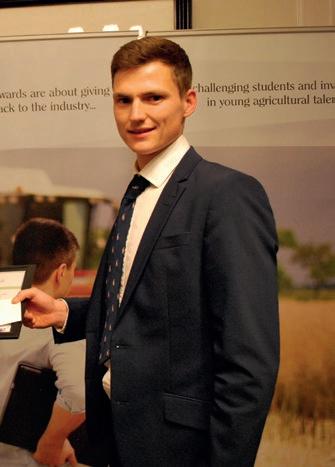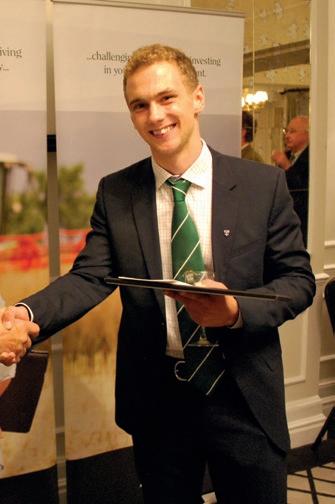
8 minute read
Pinnacle 2021
Tony Turner, Pinnacle Judge and ADAS Senior Consultant
Pinnacle performers
Farm business management skills were under intense scrutiny in the 2021 Pinnacle Awards judged in the Club this Autumn. Charles Abel reports
RESPONDING to the challenges of declining support payments was a key theme in the 2021 Farmers Club Pinnacle Awards for farm business management students.
Sponsored by the Cave Foundation and run with consultancy firm ADAS this prestigious competition drew entries from colleges and universities across the United Kingdom. Overall winner was Harry Davies of Harper Adams University, with Jacques Luckins of Bridgwater &
Taunton College placed second and Rory
Oliver from Newcastle University third.
Coping with BPS cuts
The competition champions realistic projects and people capable of driving rural businesses forwards in uncertain times, with the judges keen to see in-depth plans to help farms cope with Basic Payment cuts, backed by a strong awareness of cashflow, profit and capital, and how they link together. After a bit of a hiatus last year, caused by the covid pandemic, the awards returned to a more normal format this year, with interviews, presentations, an awards ceremony and celebration dinner all held in the Club in September.
Jimmy McLean, Chair of the judging panel, commended the finalists for their dedication in a difficult year. “With studies disrupted, and students unable to meet farmers and lecturers face-to-face, this year’s projects have been more difficult to develop than usual. It really is a tremendous achievement to get to the finals.”
The judging panel also included ADAS principal business consultant Tony Turner, Farmers Club Chairman and Kelso farmer Keith Redpath and Farmers Club Journal Editor Charles Abel.

Key criteria for the awards are precise project reports, with a succinct explanation of the business case, backed by robust financial analysis. “Some of the home truths around declining support are going to be very difficult to swallow for many farm businesses, so projects do need to look at this and where we are going as an industry,” noted Mr Turner.
The keenly contested competition saw ADAS draw up a shortlist of 8 entries from 15 submitted, with finalists interviewed in the Club in midSeptember. Choosing the winners was not easy, the judges deliberating for over an hour before arriving at a final decision.
Clear covid impact
The impact of covid was evident, highlighting the value of personal contact and site visits when developing business plans, noted Mr Redpath. “If you can’t see a farm and meet the farmer, you’re really working with one hand tied behind your back. It’s a tough ask to be given figures to work with, without access to the actual farm.”
Uncertainty around the future of farming was another recurring theme. “There was an awareness of changes coming, especially reductions in Basic Payments, but frustration at the lack of detail,” noted Mr McLean.
Farming frailties
It highlights the need to address what can be influenced, urged Mr Turner. “Understanding the frailties and strengths of the existing business is vital. There is a lot that can be done around capital repayment schedules and technical efficiency, for example, to prepare a farm business for the future. Working those plans up now is essential. It’s probably the most exciting time for farm consultancy since the 1980s, with some very significant responses possible if farmers and landowners can be convinced to make the right changes.”
The judges were keen to see a stronger focus on practical farming. “Diversification has its role, but when core business viability is threatened it isn’t always enough,” Mr Turner added. Benchmarking has value, but ensure comparisons compare like with like, so strengths can be capitalised on and weaknesses removed with confidence.
“One piece of constructive advice is to check data and make sure the basics are right,” advised Mr McLean. “Do a truth test: ‘would this make sense in the real world?’ It’s important, because if basic errors have slipped through your business plan it is going to put real doubt in a lender’s mind.” See finalist reports at:
www.thefarmersclub.com/library/pinnacleawards-reports
Pinnacle Awards 2021
Jimmy McLean, Chair of Pinnacle Judges and Farmers Club Trustee.


HARRY DAVIES,
Harper Adams University
Pinnacle Gold, Nickerson Cup, £2000
Robust plans for a low-risk added-value diversification enterprise, leveraging customer skills from an existing farmshop, without impinging on a strong core farming enterprise. Detailed market analysis revealed significant demand for secure premium-priced caravan storage. Full-costings, including occupancy and price sensitivity, loan amortisation, P+L and crucially, cashflow analysis. Robust approach to planning approval and pricing. A realistic proposal with confident interview and presentation skills.


JACQUES LUCKINS,
Bridgwater & Taunton College
Pinnacle Silver, £1000
Investigation revealed forage-based sucklers or grass/maize-fed finishers were a no-go for the college farm. But detailed costings, with cashflow and sensitivity analysis, showed carbonfriendly rose veal could work. Crisp presentation, good practical awareness, including NVZ and specialist ration plans, and realism in the face of declining support.
RORY OLIVER,
RORY OLIVER, Newcastle University
Pinnacle Bronze, £600
Moving to block cropping on three farm units more than 20 miles apart would minimise travel time and fuel costs, while maximising machinery cost savings, to counter BPS cuts. Financial data allowed for agronomic implications, a move to min-till and adoption of Enhanced Overwintered Stubbles.
Newcastle University
Pinnacle Bronze, £600
Moving to block cropping on three farm units more than 20 miles apart would minimise travel time and fuel costs, while maximising machinery cost savings, to counter BPS cuts. Financial data allowed for agronomic implications, a move to min-till and adoption of Enhanced Over-wintered Stubbles.
Runners-up (all finalists receive one-year free Club membership).
Roy McColm, SRUC Ayr
Organic yoghurt from unusual White Galloway cattle backed by a strong Dumfries and Galloway provenance story for local food outlets. Detailed plan, good marketing ideas and charismatic presentation.
Emily Mosley, Harper Adams University
Converting a derelict stone barn into two accessible holiday lets close to Chatsworth House. Detailed plans and strong financial analysis – justifying a brave, but correct, ‘not now’ recommendation.
Tom Procter, Newcastle University
Detailed data crunching for a dairy-based mixed farm, using a range of analytical tools to understand strengths and weaknesses. A forensic approach, great detail and useful recommendations.
Madeleine Twidale, Nottingham University
Analysis of an existing arable farm rotation, re-mechanisation at lower cost, plus plans for new calf-rearing and goat-meat enterprises. Ambitious, costed and enthusiastic.
Farming Figures
A look at… the changing face of farming… told through statistics

16%
UK self-sufficiency in fruit, 54% fresh veg, 71% potatoes, 86% beef/veal, 89% eggs
24,300+ subscribers
Farming vlogger Olly Harrison’s YouTube audience earning him £2438 in July
1,000 lambs/yr
Gower Salt Marsh Lambs win first Protected Geographical Indication status since Brexit
2,178 farms
Defra/RPA Sustainable Farming Incentive pilot applicants, just 5% of eligible farms
0.00018%
Methane in atmosphere, with global warming potential 28x CO2 over 100 years
£250,000
Annual AHDB funding of Red Tractor food assurance scheme, cut by £40k this year
16,000 licences
Facing abstraction fee rises as Env Agency anticipates +23% water demand by 2050
£2M

Paid for 120ha Essex arable/woodland farm by Ground Control to showcase rewilding

51p/litre
Minimum price Spanish retailer Mercadona will sell milk at. It has a 30% market share
Half

Slump in Young Farmer Club membership due to covid, making recruitment a priority
Golf Society
The relaxing of some Covid restrictions in Spring 2021 allowed outdoor activities and hospitality to resume, starting at the enchanting New Zealand Golf Club in Surrey, where Captain Neil Stoddard was delighted with a resounding victory against EPICS in late April. Sadly, matches against the NFU at Newbury and Crookham, New Club at Luffness and HCEG at Muirfield were cancelled due to Covid restrictions. But in mid-May a most enjoyable day against the British Vets at Llanymynech Golf Club brought a 5-3 Club win. Our match against XL Club was eight-a-side due to Covid restrictions and with the British Open at Royal St. Georges the match was hosted by Rye Golf Club. History repeated with a Club win, the first since last visiting Rye in 2011. Our winning run ended on a beautiful summer’s day against the very competitive West Riding NFU with a 2-4 loss at Thryberg (Rotherham). The Club Championships at Blackwell Golf Club, Bromsgrove saw 28 golfers and guests play. The course and greens were again in excellent condition, with fine weather ensuring an enjoyable day. Stephen Gordon won the Farmers Club Putter (32 points), Hazel Byford the Eric Wilson Trophy for ladies (30 points), Geoff Matthews the John Roberts Trophy for men over 70 and William Harrison the visitors prize. My thanks to all members who have supported the society and Captain Neil so far this season. Members not on the mailing list and wishing to play please contact me directly. Martin Shaw Secretary Farmers Club Golf Society
martin.edwardswale@gmail.com
From left to right: Neil Stoddard, Allan Stevenson, John Davis
From left to right: Graham Ball, Edward Golland, Mark Jones
From left to right: John Hardman, Stephen Gordon, William Harrison










